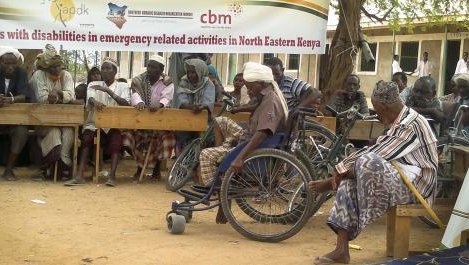(NONDO)
GARISSA, Kenya (GPI)-- Harun Hassan grew up herding goats in Kutulo, a village in Garissa County, a dry region of northeastern Kenya with little infrastructure. He lived in a Somali community of nomadic pastoralists, moving frequently in search of available water and pasture.
It never crossed his mind how disabled people would fare in his roaming community – until he became paralyzed in a car accident in March 2007.
“Living in the bush as a disabled boy was difficult. I would be left outside the house like a piece of luggage as my family went to graze our animals.”
Hussein Borle, chairman of Northern Nomadic Disabled Persons’ Organisation’s board of directors
Hassan was then a newly married provincial administration officer working for the government in Nairobi, Kenya’s capital. While traveling from Nairobi to Garissa, he got into a car accident that left him paralyzed from the neck down.
He spent a year in the hospital in Nairobi. Although he later regained use of his arms, doctors told him he would never walk again.
When he was discharged in March 2008, he had lost all hope in life, he says.
“I went back to Kutulo to die,” he says. “I knew the place had no roads, no health facilities and no means of survival for disabled people. But I insisted on going there because I thought my life was over.”
His paralysis prevented him from participating in his community’s nomadic lifestyle. His family members herded animals in distant fields, leaving him at home alone.
Then people with disabilities began to visit him. Like Hassan, they were the only ones left in the village when the rest of the community was at work. This was the first time he noticed them, he says.
“It had never occurred to me that they were there,” Hassan says. “I wondered how they lived in a nomadic community, where people are always on the move in search of pastures for their livestock.”
His visitors restored his hope in life. He abandoned his resignation to dying and began to focus on helping people with disabilities in the Somali community.
“My focus started shifting from my predicament to other people,” he says. “I realized I could do something to help.”
With the help of five friends, Hassan founded the Northern Nomadic Disabled Persons’ Organisation in 2010 to empower community members excluded by society.
In rural Kenya’s nomadic communities, disabled members cite exclusion as their limited mobility prevents their participation in traditional life and families consider them bad omens. In response, NONDO and other organizations provide equipment to disabled people and educate parents and local leaders to promote inclusion in pastoral societies.
There are more than 1.3 million people living with disabilities in Kenya, or about 3.5 percent of the population, according to Kenya's 2009 Population and Housing Census.
In a nomadic community, there may be more people living with disabilities than in other populations, Hassan says. Poor infrastructure and a lack of access to health care means that nomadic people are more likely to suffer from diseases such as polio or measles, which can cause physical disability such as blindness, he says.
Hussein Borle, a resident of Garissa town, understands how inadequate medical care affects the community’s disabled members. Borle suffered a spinal injury in 1973 at age 12 when livestock thieves raided his village and speared him in the back.















